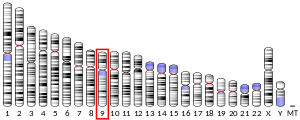From Wikipedia, the free encyclopedia
Protein-coding gene in the species Homo sapiens
U4/U6 small nuclear ribonucleoprotein Prp4 is a protein that is found in humans and encoded by the PRPF4 gene .[ 5] [ 6] [ 7]
The removal of introns from nuclear pre-mRNAs occurs on complexes called spliceosomes , which are made up of 4 small nuclear ribonucleoprotein (snRNP) particles and an undefined number of transiently associated splicing factors.
PRPF4 is 1 of several proteins that associates with U4 and U6 snRNPs.[supplied by OMIM ][ 7]
^ a b c GRCh38: Ensembl release 89: ENSG00000136875 – Ensembl , May 2017^ a b c GRCm38: Ensembl release 89: ENSMUSG00000066148 – Ensembl , May 2017^ "Human PubMed Reference:" . National Center for Biotechnology Information, U.S. National Library of Medicine .^ "Mouse PubMed Reference:" . National Center for Biotechnology Information, U.S. National Library of Medicine .^ Lauber J, Plessel G, Prehn S, Will CL, Fabrizio P, Groning K, Lane WS, Luhrmann R (Sep 1997). "The human U4/U6 snRNP contains 60 and 90kD proteins that are structurally homologous to the yeast splicing factors Prp4p and Prp3p" . RNA . 3 (8): 926– 41. PMC 1369537 PMID 9257651 . ^ Horowitz DS, Kobayashi R, Krainer AR (Dec 1997). "A new cyclophilin and the human homologues of yeast Prp3 and Prp4 form a complex associated with U4/U6 snRNPs" . RNA . 3 (12): 1374– 87. PMC 1369579 PMID 9404889 . ^ a b "Entrez Gene: PRPF4 PRP4 pre-mRNA processing factor 4 homolog (yeast)" .
Maruyama K, Sugano S (1994). "Oligo-capping: a simple method to replace the cap structure of eukaryotic mRNAs with oligoribonucleotides". Gene . 138 (1– 2): 171– 4. doi :10.1016/0378-1119(94)90802-8 . PMID 8125298 . Horowitz DS, Krainer AR (1997). "A human protein required for the second step of pre-mRNA splicing is functionally related to a yeast splicing factor" . Genes Dev . 11 (1): 139– 51. doi :10.1101/gad.11.1.139 PMID 9000057 . Wang A, Forman-Kay J, Luo Y, et al. (1997). "Identification and characterization of human genes encoding Hprp3p and Hprp4p, interacting components of the spliceosome" . Hum. Mol. Genet . 6 (12): 2117– 26. doi :10.1093/hmg/6.12.2117 PMID 9328476 . Suzuki Y, Yoshitomo-Nakagawa K, Maruyama K, et al. (1997). "Construction and characterization of a full length-enriched and a 5'-end-enriched cDNA library". Gene . 200 (1– 2): 149– 56. doi :10.1016/S0378-1119(97)00411-3 . PMID 9373149 . Heng HH, Wang A, Hu J (1998). "Mapping of the human HPRP3 and HPRP4 genes encoding U4/U6-associated splicing factors to chromosomes 1q21.1 and 9q31-q33". Genomics . 48 (2): 273– 5. doi :10.1006/geno.1997.5181 . PMID 9521884 . Kojima T, Zama T, Wada K, et al. (2001). "Cloning of human PRP4 reveals interaction with Clk1" . J. Biol. Chem . 276 (34): 32247– 56. doi :10.1074/jbc.M103790200 PMID 11418604 . Gonzalez-Santos JM, Wang A, Jones J, et al. (2002). "Central region of the human splicing factor Hprp3p interacts with Hprp4p" . J. Biol. Chem . 277 (26): 23764– 72. doi :10.1074/jbc.M111461200 PMID 11971898 . Strausberg RL, Feingold EA, Grouse LH, et al. (2003). "Generation and initial analysis of more than 15,000 full-length human and mouse cDNA sequences" . Proc. Natl. Acad. Sci. U.S.A . 99 (26): 16899– 903. Bibcode :2002PNAS...9916899M . doi :10.1073/pnas.242603899 PMC 139241 PMID 12477932 . Reidt U, Wahl MC, Fasshauer D, et al. (2003). "Crystal structure of a complex between human spliceosomal cyclophilin H and a U4/U6 snRNP-60K peptide" (PDF) . J. Mol. Biol . 331 (1): 45– 56. doi :10.1016/S0022-2836(03)00684-3 . hdl :11858/00-001M-0000-0012-F239-9 PMID 12875835 . Ingelfinger D, Göthel SF, Marahiel MA, et al. (2004). "Two protein-protein interaction sites on the spliceosome-associated human cyclophilin CypH" . Nucleic Acids Res . 31 (16): 4791– 6. doi :10.1093/nar/gkg660 . PMC 169899 PMID 12907720 . Stanĕk D, Neugebauer KM (2004). "Detection of snRNP assembly intermediates in Cajal bodies by fluorescence resonance energy transfer" . J. Cell Biol . 166 (7): 1015– 25. doi :10.1083/jcb.200405160 . PMC 2172029 PMID 15452143 . Gerhard DS, Wagner L, Feingold EA, et al. (2004). "The status, quality, and expansion of the NIH full-length cDNA project: the Mammalian Gene Collection (MGC)" . Genome Res . 14 (10B): 2121– 7. doi :10.1101/gr.2596504 . PMC 528928 PMID 15489334 . Andersen JS, Lam YW, Leung AK, et al. (2005). "Nucleolar proteome dynamics". Nature . 433 (7021): 77– 83. Bibcode :2005Natur.433...77A . doi :10.1038/nature03207 . PMID 15635413 . S2CID 4344740 . Barrios-Rodiles M, Brown KR, Ozdamar B, et al. (2005). "High-throughput mapping of a dynamic signaling network in mammalian cells". Science . 307 (5715): 1621– 5. Bibcode :2005Sci...307.1621B . doi :10.1126/science.1105776 . PMID 15761153 . S2CID 39457788 . Rual JF, Venkatesan K, Hao T, et al. (2005). "Towards a proteome-scale map of the human protein-protein interaction network". Nature . 437 (7062): 1173– 8. Bibcode :2005Natur.437.1173R . doi :10.1038/nature04209 . PMID 16189514 . S2CID 4427026 . Liu S, Rauhut R, Vornlocher HP, Lührmann R (2006). "The network of protein-protein interactions within the human U4/U6.U5 tri-snRNP" . RNA . 12 (7): 1418– 30. doi :10.1261/rna.55406 . PMC 1484429 PMID 16723661 . Huang B, Ahn YT, McPherson L, et al. (2007). "Interaction of PRP4 with Kruppel-like factor 13 regulates CCL5 transcription" . J. Immunol . 178 (11): 7081– 7. doi :10.4049/jimmunol.178.11.7081 . PMC 2674583 PMID 17513757 .






